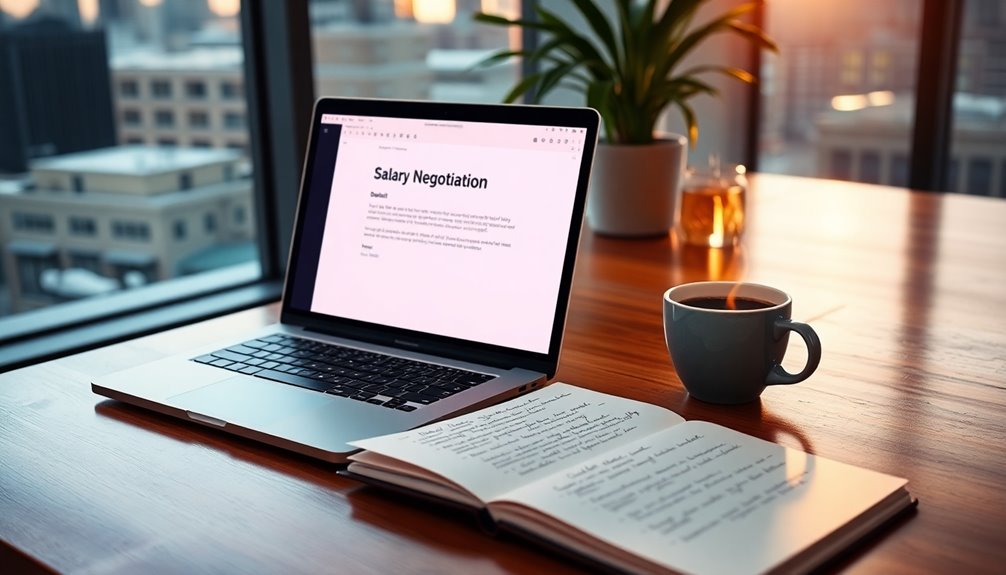To write a salary negotiation email that works in your favor, start with a clear subject line like "Offer response – [job title]." Express gratitude for the offer to set a positive tone. Present your salary expectations using a specific range based on market research, and back them up with data on your skills and achievements. Keep your email concise, ideally in three to four paragraphs, and maintain a professional tone throughout. Ending on a positive note can foster goodwill. With these strategies, you're setting yourself up for success, and there's plenty more to explore on effective negotiation tactics.
Key Takeaways
- Start with a clear subject line, such as "Offer response – [job title]," for easy identification and context.
- Open with gratitude for the offer to create a positive tone and foster goodwill.
- Present a specific salary range based on market research, emphasizing qualifications and achievements.
- Use quantifiable data to showcase past successes that align with company goals, reinforcing your value.
- Conclude positively, expressing eagerness for a response and maintaining a professional tone throughout the email.
Introduction

Negotiating your salary can feel daunting, but it's a crucial step in securing the compensation you deserve. Many candidates overlook this opportunity, with a staggering 55% not negotiating their salaries, even though 73% of hiring managers expect you to do so.
A well-crafted salary negotiation email can significantly impact your base salary and overall compensation package.
Before you hit send, it's essential to research market value for your role. Understanding industry salary benchmarks gives you leverage and demonstrates your awareness of current trends. This knowledge not only strengthens your position but also helps you set realistic salary expectations.
Remember, only 37% of candidates actively negotiate their base salary, so taking the initiative can set you apart. Highlight your qualifications and accomplishments in your email to enhance your bargaining power.
Effective negotiation isn't just about the money; it's also a vital part of your professional development.
In the following sections, we'll guide you through writing a salary negotiation email that works in your favor, ensuring you approach this important conversation with confidence.
Let's get started on securing the compensation you truly deserve!
Increases Your Earning Potential

Securing a higher salary isn't just about the immediate increase; it can significantly shape your long-term financial landscape. When you engage in salary negotiation, you're not just aiming for a better starting point; you're laying the groundwork for greater earning potential throughout your career.
Research shows that candidates who negotiate their salaries can earn up to $500,000 more by retirement compared to those who don't. This is largely due to the cumulative effect of successful negotiations.
With only 37% of candidates negotiating their base salary, there's a significant opportunity for you to stand out. New hires boast an 85% success rate in negotiating salary, making it a prime time to advocate for yourself.
Even an average salary increase of around $5,000 can have a lasting impact on your compensation packages over time.
Moreover, understanding your market value and articulating it in your negotiation email can further enhance your position. Remember, a professional greeting sets the tone for your request.
Don't underestimate the power of negotiating salary—it's your chance to increase your earning potential and secure a financially stable future.
Clear and Concise Subject Line

Crafting a clear and concise subject line is essential for capturing the hiring manager's attention. A well-structured subject line, like "Offer response – [job title]," immediately provides the recipient with context and recognition. This clarity not only reflects your communication skills but also sets a professional tone for your email.
When you're looking to negotiate your salary, avoid mentioning salary directly in the subject line. This maintains a neutral tone and keeps the focus on the purpose of your email. Research shows that candidates who use concise subject lines tend to receive more positive responses during salary negotiations. Moreover, employing data-driven decision-making can significantly enhance your approach to negotiations.
Your subject line serves as the first impression, so make it count. Highlighting the job title ensures the hiring manager knows exactly what your email pertains to, increasing the likelihood of it being opened and read promptly.
A clear subject line indicates seriousness about the negotiation process and demonstrates your professionalism. By prioritizing these elements, you'll set the stage for a successful dialogue regarding your initial offer.
Step-by-Step Guide to Negotiation Emails

A successful salary negotiation email hinges on a structured approach that conveys your intentions clearly. Start with a clear subject line like "Offer response – [job title]," ensuring your message is easily identified.
In your opening paragraph, express gratitude for the job offer or your current role, which establishes a positive tone and shows professionalism.
Next, clearly state your salary expectation by providing a specific range backed by market research and industry benchmarks. This serves as your justification for a salary increase.
Highlight your qualifications and achievements, using quantifiable results to emphasize your value to the company. For example, detail how your efforts led to increased revenue or improved efficiency.
Throughout your email, maintain a polite and professional tone, which reinforces your enthusiasm for the role while being firm in your negotiation stance.
Make sure your communication is clear, focusing on your contributions and the rationale behind your request. By following these steps, you'll not only articulate your needs effectively but also position yourself as a valuable asset to the company, paving the way for a successful negotiation outcome.
Dos and Don'ts for Negotiation Emails

When negotiating your salary via email, what key elements should you keep in mind?
First, always express gratitude. Start your email with a thank you note; this sets a positive tone and shows professionalism, which is vital for building rapport with your employer.
Next, research market averages and base your salary request on industry standards. This approach not only enhances your credibility but also makes your request more reasonable.
Highlight your value throughout your email. Clearly articulate your skills and past achievements to justify your salary request, as specific examples strengthen your case.
Remember to maintain a polite tone; avoid aggressive language, as it can create resistance and negatively impact the outcome of your salary negotiation.
Lastly, don't forget to follow up if you haven't received a response within a reasonable timeframe. A brief follow-up keeps the negotiation alive and shows your continued interest in the position.
Salary Negotiation Email Illustrations

Effective salary negotiation emails can significantly impact your career progression. Start with a clear subject line, like "Offer response – [job title]," to set a professional tone.
In the opening paragraph, express your appreciation for the offer, reinforcing a positive relationship. Then, transition to discussing the salary offered.
When you mention your salary expectations, ensure they're reasonable and backed by market research. Highlight your proven track record and personal achievements, providing justifications for your request. For example, you might say, "Based on my experience and industry benchmarks, I believe a salary of $X aligns with my contributions and the market rate." This not only showcases your value but also strengthens your position.
Throughout your email, maintain a polite tone to foster a constructive dialogue. Aim for a mutually agreeable solution, showing that you're open to discussion.
Pro Tips for Writing Effective Emails

Crafting a concise salary negotiation email is crucial for making a strong impression. Aim for three to four paragraphs to keep your message clear and focused. Start by expressing appreciation for the offer, then transition into discussing your value based on your skills and experience.
Research the market to present a specific salary range that aligns with industry standards and your qualifications. Position your desired salary toward the middle of that range to create a reasonable expectation. Utilizing data from salary surveys can bolster your request, as candidates who negotiate often see an average salary increase of $5,000.
While maintaining a professional tone, emphasize your achievements and how they contribute to the company's success. This approach not only demonstrates your worth but also fosters a positive relationship with your employer. Additionally, consider incorporating market trends into your negotiation strategy, as understanding industry dynamics can enhance your position.
Final Thoughts

Ultimately, a well-structured salary negotiation email can significantly impact your career trajectory. Taking the time to craft this email gives you the chance to negotiate your job effectively.
Remember, hiring managers expect candidates to negotiate, so don't hesitate to ask for a specific salary that reflects your value and aligns with the current market.
When writing, express how excited you're about the opportunity. A professional tone combined with enthusiasm can foster a positive relationship with your potential employer.
Highlight the benefits included in your request and back it up with data showcasing your skills and achievements. This careful consideration not only strengthens your position but also shows that you're serious about your worth.
As you wrap up your email, make sure to mention that you look forward to hearing from them. This reinforces your interest and keeps the line of communication open.
Remember, effective negotiation now can lead to better raises and promotions in the future, potentially increasing your earnings dramatically over time.
Frequently Asked Questions
How Do You Politely Negotiate Salary via Email?
To politely negotiate salary via email, start with a clear subject line and a friendly greeting.
Express gratitude for the offer, showing your appreciation.
Then, state your desired salary or range backed by market research, emphasizing your qualifications and contributions.
Use specific achievements to justify your request.
Throughout, maintain a respectful tone, convey enthusiasm for the role, and encourage an open dialogue.
This approach fosters goodwill and increases your chances of a successful negotiation.
How Do You Politely Ask to Negotiate Salary?
To politely ask to negotiate your salary, start by expressing gratitude for the offer or your current position.
Clearly state your desire to discuss the salary, referencing your research on industry standards.
Highlight your contributions and accomplishments to demonstrate your value.
Keep the tone respectful and positive, showing enthusiasm for the role.
How to Politely Ask for Salary Range Email?
To politely ask for a salary range in an email, start with a clear subject line that reflects your intent.
Thank the employer for the opportunity and express enthusiasm for the position.
Then, state your desired salary range based on your research.
Briefly justify your request by highlighting your skills and experience.
Keep your tone professional and friendly, as this helps maintain a positive relationship while discussing your compensation.
How Do You Humbly Negotiate Salary?
When you humbly negotiate salary, start by expressing gratitude for the opportunity.
Share your enthusiasm for the role, which sets a positive tone.
Clearly state your desired salary, backed by market research, and highlight your accomplishments with quantifiable results.
Maintain a respectful tone, acknowledging the employer's perspective.
Be open to discussing alternatives like additional benefits if your initial request isn't feasible.
This collaborative approach shows your willingness to find a solution that works for both sides.









